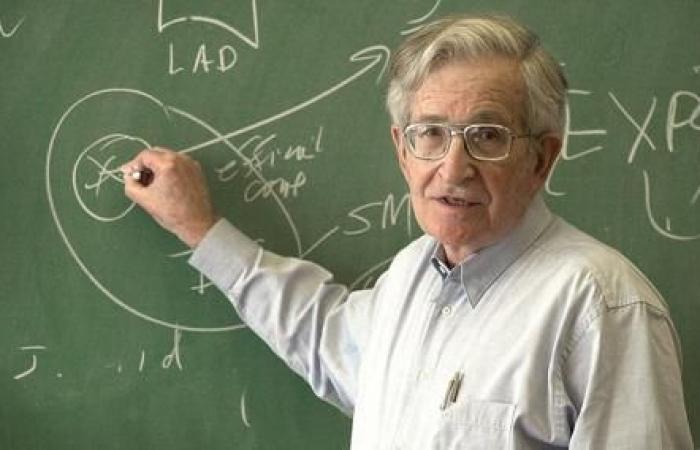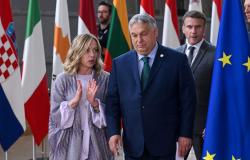Brilliant and multifaceted, Noam Chomsky had opened new horizons in linguistics, but he was equally known for his radical political stances and had also offered important contributions in the philosophical field. The professor emeritus of the Massachusetts Institute of Technology, who passed away at the age of 95 in Brazil where he was hospitalized for the consequences of a stroke, was defined as “perhaps the most important living intellectual” by the “New York Times”. newspaper that he had harshly criticized on many occasions. And this alone is enough to give the measure of his prestige.
Born in Philadelphia on December 7, 1928 to a family of Russian Jewish immigrants (his father had left the empire of the czars in 1913), Chomsky as a young man had sympathized with the currents of the Zionist left, but would later become a very harsh critic of the state of Israel, as anyone can see by reading his book Last stop Gaza (Ponte alle Grazie), written with Ilan Pappé. His political ideas soon moved towards a libertarian socialism with anarchist undertones, distant from Leninist-style communism, but irreducibly hostile to the United States establishment.
He had undertaken linguistic studies in 1947 and already in the 1950s he had begun to produce scientific contributions of absolute importance, among which we can mention the fundamental The structures of the syntaxof 1957 (Laterza, 1970), i Linguistic essays (Boringhieri, 1969), Language and the mind (Bollati Boringhieri, 2010). His wife Carol Doris Schatz, married by Chomsky in 1949 and passed away in 2008 (he then remarried in 2014 to Valeria Wasserman), was also a specialist in the same field, studying the acquisition of language in newborns.
The theory of generative-transformational grammar, developed by Chomsky, starts from the markedly creative nature of man’s linguistic capacity, which differs very clearly from the forms of communication used by other animals. Language, according to this vision, “is a finite object, but of infinite scope”, since it allows us to express an unlimited range of thoughts. This is possible because “human beings share a fixed biological background”, an innate knowledge of universal rules and principles. Newborns would not learn to speak so easily if they did not have this unconscious heritage.
On the basis of this revolutionary working hypothesis, which undermined the behavioral theories prevailing up to that point, Chomsky then developed and enriched his discoveries, making use of the contribution of a growing group of students and colleagues adhering to his basic approach. Over time, the research program called minimalism arose, based on the idea that innate syntactic modules derive from a single, smaller and deeper root, a completely automatic mental apparatus.
In an interview with Massimo Piattelli Palmarini published in “Corriere” in 2015, Chomsky summarized his most recent conclusions about human language thus: “The nucleus of the system that determines meaning is extremely simple and very close to being uniform in all languages. The complexity of languages and their diversity are in a certain sense apparent. They arise from a secondary system, a sensorial and motor system, which determines the manifest forms, that is, sounds or gestures”. This latter apparatus is necessary to transmit meanings to the outside, while “the internal system is fundamentally suited to thinking, not to communicating”.
While he was transforming the direction of linguistics, Chomsky took the field with great determination against the American military intervention in Vietnam, heavily attacking the intellectuals who were its supporters. Starting from 1965 his political excursions became more frequent, until they converged in the volumeThe new mandarins(Einaudi, 1969, then republished by Saggiatore in 2012), the first of a long series of books aimed against the foreign policy of the United States, accused of masking brutal imperialism with hypocritical justifications.
Chomsky believed that there was full continuity between the various US administrations in pursuing an aggressive line towards the liberation movements of oppressed peoples, especially in Asia, the Middle East and Latin America. One of his most significant pamphlets by him, entitled At the court of King Arthur (Elèuthera, 1994), aimed to dispel the myth of Kennedy’s presidency (in this he clearly disagreed with Oliver Stone) and denounce his role in starting the Vietnam War.
It must be added that Chomsky’s fervor in highlighting the faults of the United States often led him to idealize their adversaries and provide a very watered-down image of them. Far from being pro-Soviet, he was nevertheless very benevolent towards the revolutionary movements of the Third World, to the point of committing serious errors, as when in 1977, in an article written together with Edward Herman, he had branded them as “fourth-hand distortions”, the result of anti-communist propaganda, the first news spread in the West about the genocide perpetrated in Cambodia by the Khmer Rouge. More generally, the fury with which Chomsky criticized the conformism and bias of the American media seemed excessive, while at the same time defending regimes (China, North Vietnam, Cuba) in which not the faintest glimmer of any freedom of the press existed.
The most sensational incident in which the great linguist had stumbled, however, concerns the Shoah. In 1979 Chomsky had signed an appeal in defense of the freedom of expression of Robert Faurisson, a French author known for having denied the existence of gas chambers in Nazi concentration camps. This had aroused the indignant reaction of many intellectuals, including the historian Pierre Vidal-Naquet, to whom Chomsky had responded not only by stating that “it is precisely the right to freely express the most frightening ideas that must be most strenuously defended”. », but denying that Faurisson was anti-Semitic and presenting him as «a kind of relatively apolitical liberal». To which Vidal-Naquet had observed that Chomsky had “gave his trust to a forger” and had allowed himself to “repaint him with the colors of truth”, siding with “those who make themselves publishers and defenders of neo-Nazis”.
Undisputed authority in the field of linguistics, undoubtedly courageous in his polemic against the Western ruling classes, Chomsky had ended up pushing too far a provocative tendency which had sometimes made him forget the necessary prudence with which those equipped with considerable prestige in judging the often complex and contradictory facts of history and politics.






